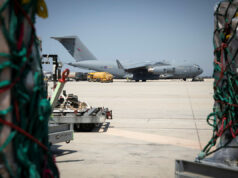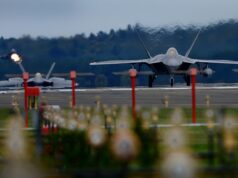The Ministry of Defence has contacted the employers of Armed Forces Reservists to keep them up to date with regards to the ‘intelligent mobilisation’ of Reserve Forces to support the national response to COVID-19.
It is expected that 3,000 Reservists will be required as part of this tranche and will initially be mobilised for six months, to be kept under review.
The MoD say that Major General Simon Brooks-Ward, Assistant Chief of the Defence Staff (Reserves and Cadets), has written to the employers of the Reservists, to thank them for their on-going support and explain how the Armed Forces proposes to use its Reservists in support of the nation’s response to COVID-19.
At the moment, only Reservists with specialist skills that meet specific requests for help from other government departments will be called out.
Maj Gen Brooks-Ward said in his letter:
“This is just the initial stage of the tried and tested ‘intelligent mobilisation’ process. It is intended to fill specific gaps by carefully selecting the right reservists available. As and when those reservists are selected, they should inform their employers and ensure there are no compelling reasons why they cannot be released, before confirming their availability for mobilisation.”
No one already working for the NHS or delivering front line services will be mobilised to make sure these key workers can continue their excellent and critical efforts, say the MoD.
Maj Gen Brooks-Ward goes on to say:
“The reservists – your employees – who are mobilised for the COVID-19 Support Force will be working for the benefit of everyone in the country, including their local communities and civilian employers. Thank you again for your help making that possible. The Reserve Forces will be used to help deliver a range activities, such as providing additional medical and logistical support for the NHS, acting as liaison officers and deploying specialist skills such as engineering and accounting.”













I may be wrong however, there did appear to be a hiatus in the initial supply flow to hospitals around the country? If true why didn’t the armed forces use the assets at its disposal in considerable numbers? PPE packs could have been transported directly to the hospitals by helicopters, mass Army convoys on closed motorways and major routes to ensure fast and immediate delivery. As I said, this may have been a misconception on my part, so apologise if wrong. One fact is clear, the cogs within cogs do appear to be stepping up to the challenge, and many thanks to all military personnel involved.
Indeed, my son is in the RLC having just returned from NATO exercise Defend Europe 20, but is still licking his heels at his barracks. He’s love to get involved and help.
Thanks, Andy for clarifying the situation. Obviously there will be a post virus review as to how the process of delivery and general support can be improved? It’s okay to comment on the speed of response, but the Government is on an aggressive learning curve, just as is the rest of the World at battling against COVID-19.
Closing motorways would not be necessary. Motorway traffic is minimal and we need to keep the existing supply chains open which support society in general open. An enhancement to flag domestic vehicles travelling more than say 5 miles from their home address will clear even more of the arterial roads.
I think that one of the major unseen problems is that the Civil Service has been so cut back and de-skilled over the years that it is now struggling to deal with the current situation.
There was a recent NAO report into the issues with the MoD that highlighted a lack of necessary skills in key areas such as finance of all things! I strongly suspect that this has happened across the Civil Service. Given that many like to knock the Civil Service (even though most know precisely zip about what it does), few would chose a career of service over say KPMG…
The result is that the middle tier of the Civil Service has probably been so disempowered over the last couple of decades that there are now serious questions about its resilience outside of normal and accepted precedures. Throw in the fact that many will now be self isolating and its abilities to react to decisions being made at Cabinet level appear to be significantly disrupted.
Not only that but we operate an ‘efficient’ economy with just in time delivery perculating throughout our systems. Such systems are all too easily overwhelmed when things go wrong, but they are the cheapest to run. So NHS Supply has enough trucks and drivers to meet normal demand, rotate trucks through servicing and drivers through leave periods and meet localised emergencies. Covid-19 has reduced the number of drivers, mechanics, order processing and route planners and hugely increased demand across the whole system.
Sending the Army in to help is having a positive impact, but they will take time to bed in and back fill the gaps left by those who support the drivers i.e. those who know their way around the logistics software…
All I can say is that our NHS, Military Services and, yes, the Civil Service are doing a pretty good job under the circumstances and by that I include consideration of the dreadful lack of effective investment across the board. A 500 bed hospital with ability to expand to 4000 beds and other regions building their own field hospitals, mobilising industry to build 1000’s more ventiliators, hotels (in my region at least) being converted to look after patients who are less seriously ill…
Covid-19 was ‘officially’ reported as occuring in the first week of December 2019. From nothing to rolling global shutdown in under 4 months (Early to Mid March). I think that counts as a social and economic shock!
Hi ChariotRider, the issue with the Civil Service is that many roles have been outsourced due to EU regulations to large companies many of which in turn outsource to smaller companies and individuals who actually have and maintain the skills. Civil Servants then find that the way to promotion comes by moving department and consequently do not necessarily remain in key areas long enough to build up experience in that area.
There is nothing wrong with outsourcing per see but it would be far better if Departments cut out the middle men and developed a relationship directly with those companies with the skills – then they would be better placed to utilise those skills in a crisis.
Also there should perhaps be more emphasis within the Civil Service in developing and maintaining experience in particular areas.